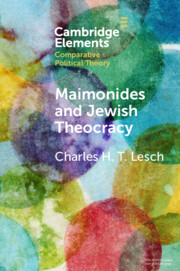Refine search
Actions for selected content:
1 results

Maimonides and Jewish Theocracy
- The Human Hand of Divine Rule
-
- Published online:
- 26 November 2024
- Print publication:
- 19 December 2024
-
- Element
-
- You have access
- Open access
- HTML
- Export citation
